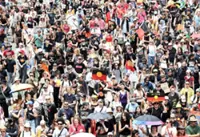Bilkuin Jimmysali, Enidah Mulsid and Shima Manan are barely out of their teens but they have been vested with the responsibility to provide basic education to the children of their Bajau Laut community in Pulau Omadal, a remote island on the waters off Semporna, Sabah.
Tagged as mastal arikik, which in the Bajau dialect means ‘little teacher’, the trio is doing what they can to teach the three Rs (reading, writing and arithmetic) to the children because they know the mastery of these basic skills will eventually help them to have a better quality of life.





